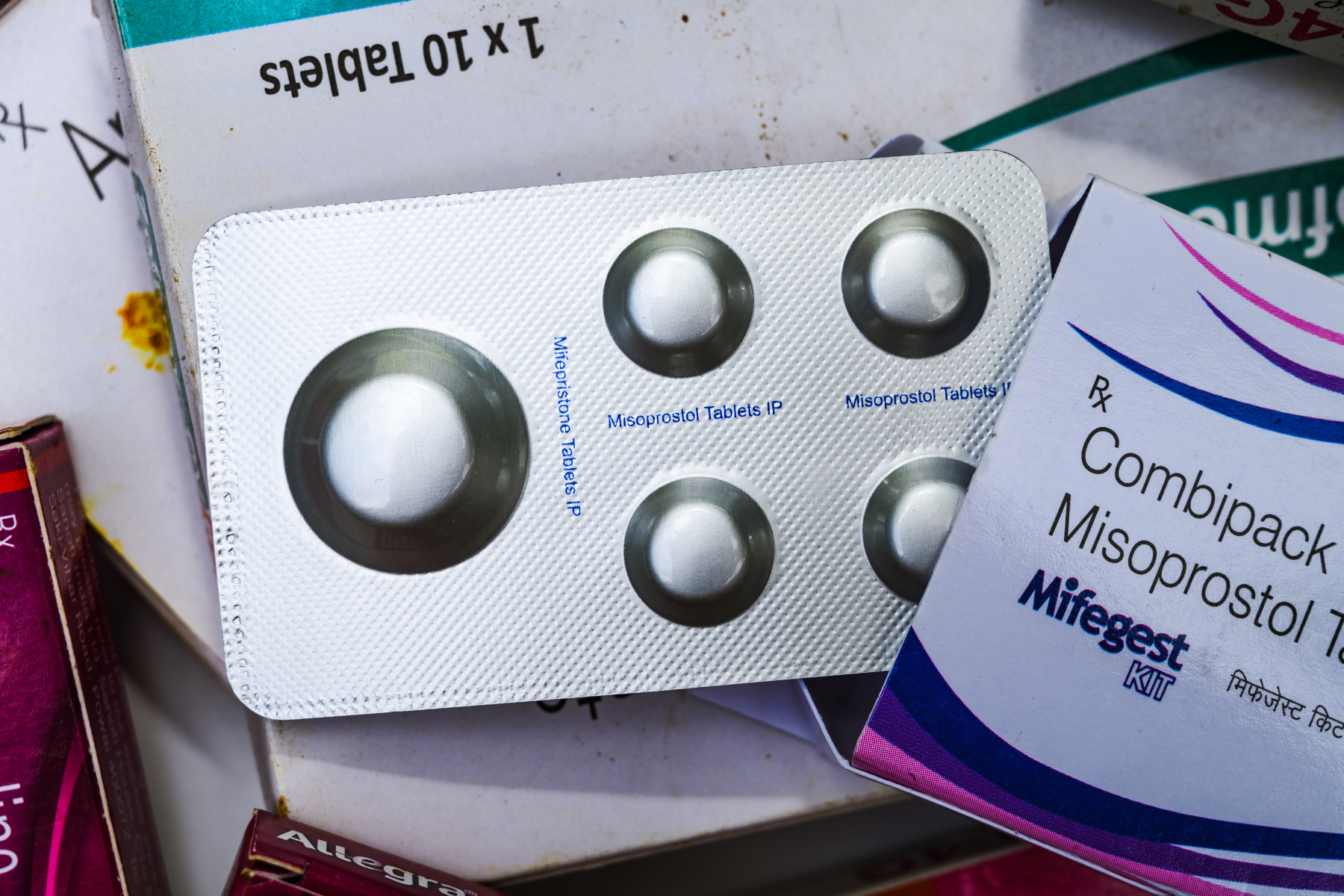A Supreme Court battle that will play out next week over how patients access mifepristone — one of the two drugs used in a medication abortion — could have sweeping consequences for Americans, regardless of their state’s abortion laws.
In recent years, Americans seeking to terminate their pregnancies have come to increasingly rely on the pills, with medication now making up a majority of all abortions.
The court will hear arguments from a coalition of anti-abortion medical providers, who say that the U.S. Food and Drug Administration (FDA) erred in a 2016 decision to expand access to mifepristone, which is sold both under the brand name Mifeprex and as a generic drug. At the time, the agency held that the drug can be prescribed up to 10 weeks into pregnancy instead of seven and removed a requirement that it be dispensed over three in-person visits. This paved the way for prescriptions through telemedicine, in which patients can have a virtual consultation with a medical provider and then receive the pills in the mail to take at home. This offers an option for patients who cannot — or prefer not — to make the journey to a clinic or who aren’t able to book a timely in-person appointment.
There is no legal precedent for the judiciary overriding the FDA’s approval of a drug. Health researchers say reimposing tighter restrictions would fly in the face of medical evidence which suggests that mifepristone is safe and effective through the first trimester. The same research also suggests little medical need to visit a provider in-person. Studies cited by the Alliance for Hippocratic Medicine, the anti-abortion organization seeking to limit use of mifepristone — which implied that drug leads to a high rate of complications and emergency room visits — were retracted last month by the journal that had originally published them, a move suggesting serious concerns about their methodology.
Reinstating an in-person requirement could substantially curtail access to abortion in the post-Roe v. Wade landscape. With abortion almost completely illegal in 14 states and banned after six weeks in two more, people seeking to terminate pregnancies are now far more likely to rely on telemedicine.
Data published in February by the Society for Family Planning’s WeCount initiative, which tracks abortion provision in the United States, found that telemedicine abortion accounted for 16 percent of abortions performed from June to September 2023. That translates to roughly 15,000 per month. It’s a percentage some anticipate will grow, barring legal changes.
“The share of telehealth has been growing so rapidly,” said Ushma Upadhyay, an associate professor at the University of California, San Francisco and co-chair of the WeCount research team, who has studied the prevalence of telehealth abortion. “As people become more comfortable — as they learn more about how an abortion can be had with pills, and the entire process can be done from home — I do think that number will continue to increase.”
Despite telemedicine’s rapid growth, research indicates that the population it serves looks markedly different from those who seek abortions in clinics: Patients pursuing virtual care are more often White, wealthier, 30 or older, and without children. People who rely on clinics for care are disproportionately Black and Latinx, usually already parents, and largely in their 20s.
Researchers and medical providers aren’t sure why that is. But they have some ideas.
“People may just not know this is an option — or may not trust it’s an option or a safe option for getting their medications,” said Kari White, the executive and scientific director of Resound Research for Reproductive Health, a Texas-based nonprofit organization that studies reproductive health care policy.
In states where abortion remains legal, and that haven’t outlawed telemedicine, the option is available from medical clinics, as well as from online companies like Hey Jane, a startup founded in 2020. Hey Jane specifically accounts for about 18 percent of abortions in Virginia and Delaware, and 15 percent of abortions in Hawaii, according to data shared by the company.
Providers in states with legal abortion say the rise of telemedicine has allowed them to expand their capacity, particularly if they have seen a large influx of patients from a place where the procedure is banned.
In states with abortion bans, telemedicine is one of the few workarounds for people hoping to end their pregnancies, though the legality is uncertain. Physicians in six states where abortion is legal prescribe medication abortion pills and mail them to patients in other states. They rely on so-called “shield laws” that are meant to protect prescribing doctors from out-of-state prosecution.
Three providers follow this model: Aid Access, Abuzz and the Cambridge-based Massachusetts Medication Abortion Access Project. At Aid Access, the largest of the three, providers estimate they mail 7,000 to 10,000 pills per month, with the majority going to patients in states with abortion restrictions.
For those patients, telemedicine offers a far more affordable option than driving several hours or flying out of state for care. Pills are typically $150 to $250, and all three services offer patients discounts if that is too much to pay. But it brings its own layer of legal risk.
Anti-abortion activists and lawmakers have indicated that they plan to pursue legal action to curtail telemedicine and to challenge shield laws. Last week, 16 Republican attorneys general threatened to sue the state of Maine if legislators there pass a proposed shield bill, which would also aim to protect providers who care for transgender patients.
So far, no patient or medical provider who has relied on a shield law has faced legal action. Still, Upadhyay said, the ambiguity could be a particular concern for Black and Latinx patients, who often live in communities with larger police presences. Research shows that Black women and working-class White women are both more likely than middle-class or wealthier White women to face criminal prosecution when they experience adverse pregnancy outcomes, such as miscarriage. Taking medication in a state with an abortion ban is riskier than traveling somewhere where it is legal.
“It could be that they would rather make the eight-hour journey to get to an abortion if they feel that is more legally safe,” Upadhyay said.
White, who has researched why people seek abortions and the barriers they face, said patients concerned about privacy at home – those who don’t want their family to know about their abortion — have also expressed some doubts about telehealth. “People have some concerns about privacy and confidentiality,” she said.
If the court decides to reimpose the seven-week limit, doctors in some states could try to circumvent it by offering the medication through what is called “off-label” prescribing. A doctor can recommend use of a drug for a purpose other than the one for which it was federally approved, as long as it is in keeping with medical literature and evidence.
Reinstating the three-visit requirement could also make medication abortion less attainable for patients who must travel a long distance to terminate a pregnancy. Currently, patients receiving medication abortions, even in person, are able to receive the medications in one visit and then complete the process at home, with an optional in-person follow-up afterward.
If making three in-person visits is not possible – because of the time or money required for those trips — patients would likely have to opt for a simple surgical procedure instead. This option also has a very low risk of complications, especially earlier in pregnancy, and can be finished within the day. But far fewer clinics have staff trained in providing that type of abortion, meaning patients would have fewer options for care.
If the Supreme Court issues a ruling barring abortion by telemedicine, it’s not clear how quickly it would have an effect on doctors’ practice. Physicians who provide virtual abortions say they’re unsure how they would respond, but they’re weighing their options.
“I don’t know what to think. It’s so hard to prepare for because it’s so insane. But we are thinking about what to do,” said Dr. Linda Prine, a New York-based physician who works as a telehealth provider for Aid Access.
The organization could switch to mailing patients just misoprostol, the other drug involved in medication abortions. A misoprostol-only regimen is still safe and generally effective, though it is more painful and has a higher failure rate than the two-drug combination. Prescribers could also revert to an older model, ordering medications from other countries, though that can often result in delays, pushing patients later into pregnancy. They could also engage in what Prine called “civil disobedience” — mailing pills to patients anyway. But not all medical providers may be willing to take on that risk.
“It’s hard to believe that this is getting any kind of uptick, that they’re even going to listen to this for a minute,” Prine said, referring to the Supreme Court. “I’m just so flabbergasted at the whole thing.”







